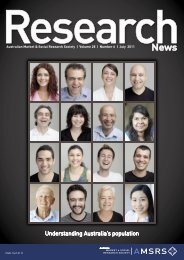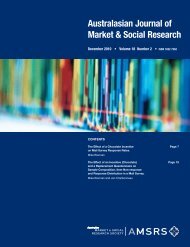Asia Pacific region - aprc-research
Asia Pacific region - aprc-research
Asia Pacific region - aprc-research
Create successful ePaper yourself
Turn your PDF publications into a flip-book with our unique Google optimized e-Paper software.
THE WORD’S OUT<br />
Language, social media and thought<br />
Social media is all about language and the<br />
written word. People are writing more than<br />
ever before with status updates, tweets<br />
and blogs. There is now a constant stream of text<br />
about what we do and think. Of course this is a<br />
huge opportunity for market <strong>research</strong>.<br />
The question becomes how to process the<br />
never-ending streams of text available on social<br />
media. Computers are good at calculations, but<br />
text analysis has always been the problem child.<br />
Language has a complexity that simple numbers<br />
can’t capture.<br />
Two schools of thought seem to be crystallising<br />
as to how we analyse social media. The first<br />
emphasises what is generally called ‘natural<br />
language processing’. Using this approach comprehension<br />
comes via computerised parsing and<br />
analysis of the text based on our understanding<br />
of language. Grammar is the key. The second<br />
approach is statistical. It emphasises analytical<br />
techniques such as Latent Semantic Analysis<br />
(LSA), which uses the statistical properties of text<br />
to glean meaning from it.<br />
Text analytics is the new frontier that market<br />
<strong>research</strong> must conquer. The sheer volume of text<br />
can’t be ignored, but it can’t be coded and tabulated<br />
the same way open ends are today. There is simply<br />
too much. In some senses the contest of grammar<br />
versus statistics has already been decided. When<br />
you look at text from social media it isn’t grammatically<br />
correct, because we don’t speak and<br />
communicate in formal blocks of text using perfect<br />
grammar. Hence the grammar route is fundamentally<br />
at a disadvantage. The argot of web may well<br />
defy parsing. It’s significant that search engines<br />
such as Google and Yahoo use techniques very close<br />
to LSA to process documents and decide how they<br />
are related. The core metric of LSA is word counts<br />
and co-occurrence of words in documents. Given<br />
that search engines are the tools that have made the<br />
web usable it is worth paying attention to this.<br />
The problem is sentiment. One of the critical<br />
tasks for analysis of social media is deciding if a<br />
tweet or status update has a positive or negative<br />
tone. Is the buzz about a product good or bad If you<br />
can automatically tell the sentiment of comments<br />
relating to products or services you have a powerful<br />
<strong>research</strong> tool. Sentiment analysis is currently a hard<br />
thing to do accurately. Anything over 75 per cent accuracy<br />
in sentiment analysis is currently regarded<br />
as pretty good, but this still leaves a large margin<br />
for error. At the moment the only accurate way to<br />
assess sentiment is for a human to read the text,<br />
but there is simply too much text being produced by<br />
social media for this to be practical.<br />
Sentiment analysis of social media is rapidly<br />
becoming the ultimate goal for text analysis and<br />
market <strong>research</strong>. We need more sentiment to<br />
master social media.<br />
Andrew Jeavons is a member of Nebu,<br />
which is working to bring innovation to<br />
survey software. You can contact him at<br />
andrewjeavons@nebu.com<br />
This article was first published in Research<br />
World, the magazine for marketing<br />
intelligence and decision making published<br />
by ESOMAR. For more details go to<br />
http://rwconnect.esomar.org<br />
Ask around. You’ll find West Coast Field Services is your<br />
best WA field provider - and has been for over 20 yrs.<br />
These days, just about anyone with a database claims to offer market <strong>research</strong>. But surely<br />
your clients deserve quality data that they can rely on<br />
For professional Western Australian field resources , you need West Coast Field Services<br />
(WCFS). Contact us for CATI, F2F, online, mystery shops, group recruiting and group rooms.<br />
We have been WA’s premier <strong>research</strong> field resource for over 20 years, and are the only WA<br />
field company that is purely dedicated to market <strong>research</strong>, - and to our clients of course!<br />
The WCFS team members are long standing professionals in market <strong>research</strong>.<br />
All interviewers are trained to ISO 20252 standards. (Exceed them actually).<br />
Our 20,000 strong database recruited from random dial surveys – no customer<br />
or telemarketing sales lists.<br />
Foundation AMSRO members in WA and continue to uphold AMSRO awards<br />
and standards.<br />
Our 20,000 strong groups database is morphing into WestSense, the only WA focussed<br />
pure market <strong>research</strong> online panel.<br />
Where integrity still matters. Ask around.<br />
Contact Sandra Simpson for your West Australian field needs. 08 9316 3366. Sandra@wcfs.com.au. www.wcfs.com.au





